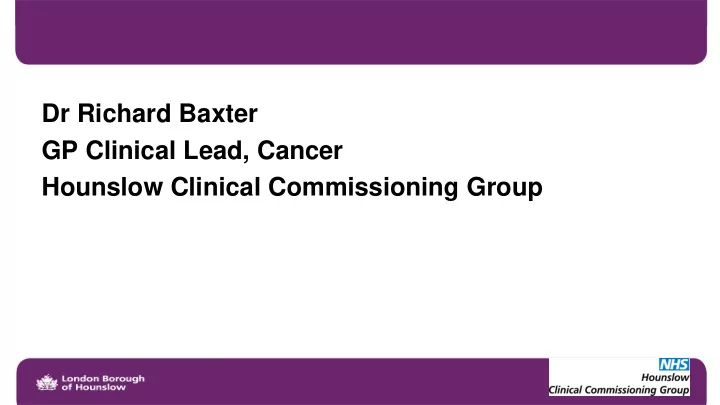

Dr Richard Baxter GP Clinical Lead, Cancer Hounslow Clinical Commissioning Group
• Prevention. Reducing the likelihood of cancer occurring in individuals without this. • Screening. Identifying individuals with cancer very early before they have any symptoms. • Early presentation. Raising awareness of which are the key symptoms and ensuring people attend with these. • Prompt referral to treatment. Raising awareness amongst GPs of who should be referred and ensuring urgent referral pathways work well. • Primary treatment. • Survivorship. • End of life
Cancer Screening and Cancer in Hounslow • Living a healthy lifestyle can help prevent some types of cancer • Key actions to take: – Not smoking – Eat healthily (at least ‘5 a Day’ of fruit and vegetables) – Take enough exercise: at least 150 minutes of moderate aerobic activity such as cycling or fast walking every week, and strength exercises on two or more days a week that work all the major muscles (legs, hips, back, abdomen, chest, shoulders and arms). – Drinking alcohol in moderation or not drinking alcohol
Early preventable cancer deaths in Hounslow reducing and more can be prevented
Breast Cancer: ‘Breast awareness Five-Point Code’ • Know what is normal for you • Look and feel • Know what changes to look for • Report any changes without delay • Attend for breast screening if aged 50 or over
Changes to look out for • Appearance. Any change in the outline or shape of the breast, especially those caused by arm movements, or by lifting the breasts. Any puckering or dimpling of the skin. • Feelings . Discomfort or pain in one breast that is different from normal, particularly if new and persistent. • Lumps. Any lumps, thickening or bumpy areas in one breast or armpit which seem to be different from the same part of the other breast and armpit. This is very important if new. • Nipple change. Nipple discharge, new for you and not milky. Bleeding or moist reddish areas which don’t heal easily. Any change in nipple position – pulled in or pointing differently. A nipple rash on or around the nipple.
Breast screening service • All women aged 50 to 70 are invited for breast screening every 3 years. • Screening saves lives from breast cancer : Lives are saved because cancers are diagnosed and treated earlier than they would have been without screening. • Screening finds breast cancers that would never have caused a woman harm • What is breast screening? Breast screening uses an X-ray test called a mammogram to check the breast for signs of cancer. It can spot cancers that are too small to see or feel. • Results: You will receive a letter with your breast screening results within 2 weeks of your appointment. The results will also be sent to your GP. • For more information about breast screening visit: www.nhs.uk/conditions/breast-cancer-screening
Breast screening coverage in Hounslow 2010-2016
Cervical Cancer • What is cervical cancer? • What causes cervical cancer?
Cervical Cancer Screening • NHS cervical screening helps prevent cervical cancer: It saves as many as 5,000 lives from cervical cancer each year in the UK • Who is invited? The NHS offers cervical screening to all women aged 25 to 49 every 3 years and to all women aged 50 to 64 every 5 years
Cervical Screening: • Usually carried by female doctor or nurse • Should receive results in two weeks
Cervical screening levels in Hounslow 2010-2016
Bowel Cancer Screening: Purpose • Bowel cancer screening aims to detect bowel cancer at an early stage (in people with no symptoms), when treatment is more likely to be effective. • Bowel cancer screening can also detect polyps. These are not cancers, but may develop into cancers over time. They can easily be removed, reducing the risk of bowel cancer developing .
Who is at risk of developing bowel cancer? • Both men and women are at risk of developing bowel cancer. • Your risk of developing bowel cancer increases with age. Eight out of 10 people who are diagnosed with bowel cancer are over 60. • People with a family history of bowel cancer have an increased risk of developing the disease. • People who take little exercise, people who are overweight, and people who have a diet high in red meat and low in vegetables, fruits and fibre are all thought to have an increased risk of developing bowel cancer.
The bowel cancer screening test • The screening test detects tiny amounts of blood, which you cannot normally see, in your bowel motions (poo) • It is called the Faecal Occult Blood (FOB ) test (‘occult blood’ means hidden blood ). • You carry out the FOB test in the privacy of your own home. The screening kit provides a simple way for you to collect small samples of your bowel motions. • You wipe the samples on a special card, which you then send in a hygienically sealed Freepost envelope to a laboratory for testing.
Bowel screening: summary of screening results
Bowel cancer screening uptake in Hounslow 2015-2016
Any questions?
Recommend
More recommend